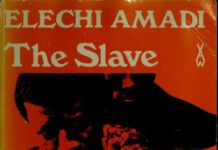Plot Summary of “The Voice”
The Voice (1964) by Gabriel Okara is a remarkable linguistic experiment in which Okara translated directly from the Ijo (Ijaw) language. The novel, which is his first, creates a symbolic landscape in which the forces of traditional African culture and Western materialism contend.
Okolo, whose name translates as the voice in the novel, returns from studying abroad to live in his small village of Amatu. He is fired with the unquenchable desire to find what he calls ‘it’, the meaning or essence of life but, this thirst for understanding does not sit well with the traditional power structures of Amatu.
The village chief, Ozongo, along with his elders, thinks that Okolo’s willingness to question everything threatens their traditional position.
Passions are inflamed against Okolo and, despite the support of other social outcasts, he is eventually forced to leave the village. Chief Izongo orders Okolo to be tortured and exiled from the community for refusing to call an end to his quest.
When Okolo moves to Sologa, he discovers that the city lacks ‘it’ as well. He finds himself in a home filled with human remains when he first arrives in this town. Later, he runs into a police officer and tells him about the bones. The policeman remarks that the owner of the home is a ‘bigman’ who is impervious to difficulties.
The policeman takes leave to look into Okolo’s accusation after the naive Okolo demands that he act. He walks some distance, hides in a phone booth, and then slips inside a pub.
Okolo keeps meandering across the city after futilely waiting for the constable. But everywhere he goes, people advise him to give up on his search for ‘it’.
When Okolo makes the decision to go back to Amatu, he discovers that everyone is having a party to mark his leaving. Chief Izongo is infuriated about Okolo’s return and orders that he be tied to a canoe and drowned in the river.

Chapter by Chapter Summary
Okara’s The Voice is segmented into twelve chapters. We have summarised these chapters in another blog post.
Characterisation in “The Voice”
The characters in Gabriel Okara’s The Voice include Okolo, Chief Izongo, Tuere, Abadi, Messengers, Benitu and Tuduo.
We have briefly discussed each character in a different post.
Themes in “The Voice”
The themes in The Voice are the themes of bribery and corruption, violence and social oppression, and disillusionment.
Memorable Quotes
- “Okolo had no chest, they said. His chest was not strong and he had no shadow”
(Chapter 1, p.23). - “Listen not to him. He speaks this way always because he passed standard six. Because he passed standard six his ears refuseth nothing, his inside refuseth nothing like a dustbin” (Chapter 1, p.24).
- “Speak of this thing no more. The ears of Amatu are open. If this the ears of Izongo enters, we will fall from our jobs” (Chapter 1, p.25).
- “Doesn’t shame fall on your head, you man without a chest, for saying you want to burn a woman’s house down to the ground? If you are a male man be with a strong chest, come and take him” (Chapter 2, p. 36).
- “Tell me the bottom of everything,’ Okolo said with a soft voice. ‘We have been friends for a long time since we were children so tell me the bottom of everything. There is nobody here” (Chapter 2, p. 40).
- “You must leave this town. It will pain our insides too much to see you suffer. We are a soft people and even now if you agree to join us, we untie your hands and you will have no need to knock your head against stone as you are doing now” (Chapter 2, p.48).
- “Even if a person inside water lets out gas, the odour floats up to the surface. You know not even this the saying of our Izon people?” (Chapter 3, p.66).
- “Yes, they are singing with voices like a piece of earth, and drinking with throats that pick nothing, and shaking the world with their looking-at-nothing feet” (Chapter 4, p. 73).
- “I have not the big thing between us forgotten. You will of my doings hear concerning it” (Chapter 5, p. 75).
- “I have already told you. Be sensible and be a good lad. This country will need men like you, if only you learn to shut your eyes at certain things” (Chapter 5, p. 88).
- “It is bad money. Bad money never brings good to anyone.” (Chapter 6, p. 92).
- “He says the money paid them by Izongo is bad money and that he, too, like Okolo will speak. Only he says the time is not correct yet” (Chapter 6, p.96).
- “Yes! He who touches me his fingers will burn! What is yours” (Chapter 7, p. 99).
- “Without money I can’t find him. Money is inside everything in Sologa” (Chapter 8, p.104).
- “A dead man’s shadow has entered this house” (Chapter 9, p.108).
- “I am Chief Izongo. My name, like the wind, has reached everywhere, has entered everybody’s ears. And people know me as one who always does the straight thing and that is doing what has come out of my mouth” (Chapter 12, p. 126).
Further Reading:
- Chapter by Chapter Summary of Gabriel Okara’s “The Voice”
- Characters in Gabriel Okara’s “The Voice”
- Themes in Gabriel Okara’s “The Voice”
 WHATSAPP: Click HERE to join the new Literature PADI WhatsApp group to receive latest updates on your phone and for further literary discussions!
WHATSAPP: Click HERE to join the new Literature PADI WhatsApp group to receive latest updates on your phone and for further literary discussions!









